定语从句中:只用that而不用which的五种情况
(完整版)定语从句中只能用that的情况
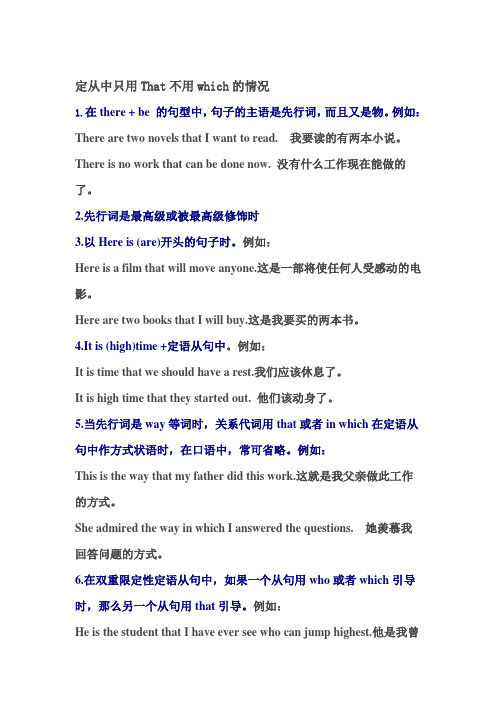
定从中只用That不用which的情况1.在there + be 的句型中,句子的主语是先行词,而且又是物。
例如:There are two novels that I want to read.我要读的有两本小说。
There is no work that can be done now. 没有什么工作现在能做的了。
2.先行词是最高级或被最高级修饰时3.以Here is (are)开头的句子时。
例如:Here is a film that will move anyone.这是一部将使任何人受感动的电影。
Here are two books that I will buy.这是我要买的两本书。
4.It is (high)time +定语从句中。
例如:It is time that we should have a rest.我们应该休息了。
It is high time that they started out. 他们该动身了。
5.当先行词是way等词时,关系代词用that或者in which在定语从句中作方式状语时,在口语中,常可省略。
例如:This is the way that my father did this work.这就是我父亲做此工作的方式。
She admired the way in which I answered the questions.她羡慕我回答问题的方式。
6.在双重限定性定语从句中,如果一个从句用who或者which引导时,那么另一个从句用that引导。
例如:He is the student that I have ever see who can jump highest.他是我曾经看到过跳得最高的学生。
My brother studies in the school which is the most beautiful in our city that isn’t far from here. 我的弟弟在我们的城市最美丽的学校读书,并且离这儿不远。
英语定语从句用that不用which的情况
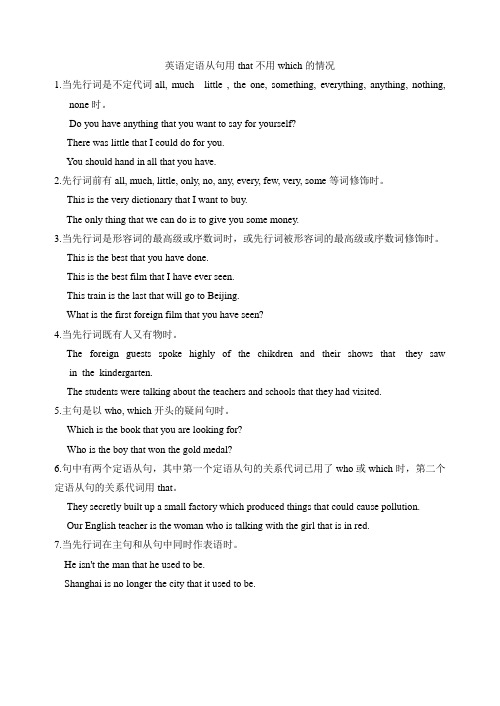
英语定语从句用that不用which的情况1.当先行词是不定代词all, much little , the one, something, everything, anything, nothing,none时。
Do you have anything that you want to say for yourself?There was little that I could do for you.You should hand in all that you have.2.先行词前有all, much, little, only, no, any, every, few, very, some等词修饰时。
This is the very dictionary that I want to buy.The only thing that we can do is to give you some money.3.当先行词是形容词的最高级或序数词时,或先行词被形容词的最高级或序数词修饰时。
This is the best that you have done.This is the best film that I have ever seen.This train is the last that will go to Beijing.What is the first foreign film that you have seen?4.当先行词既有人又有物时。
The foreign guests spoke highly of the chikdren and their shows that they saw in the kindergarten.The students were talking about the teachers and schools that they had visited.5.主句是以who, which开头的疑问句时。
定语从句中只用that不用which的五种情况
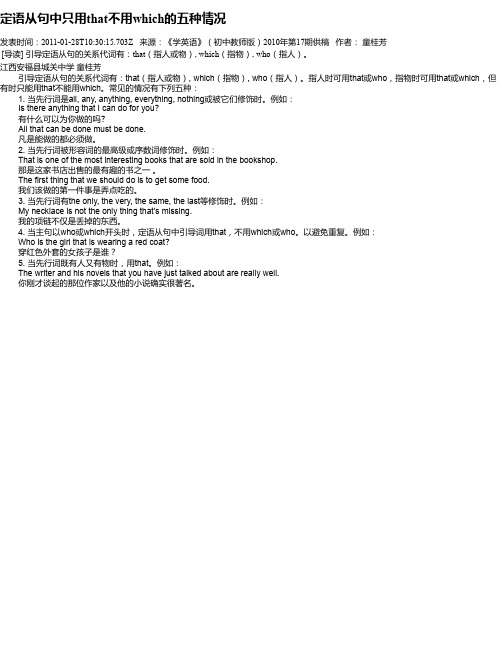
定语从句中只用that不用which的五种情况发表时间:2011-01-28T10:30:15.703Z 来源:《学英语》(初中教师版)2010年第17期供稿作者:童桂芳[导读] 引导定语从句的关系代词有:that(指人或物), which(指物), who(指人)。
江西安福县城关中学童桂芳引导定语从句的关系代词有:that(指人或物), which(指物), who(指人)。
指人时可用that或who,指物时可用that或which,但有时只能用that不能用which。
常见的情况有下列五种: 1. 当先行词是all, any, anything, everything, nothing或被它们修饰时。
例如: Is there anything that I can do for you?有什么可以为你做的吗?All that can be done must be done.凡是能做的都必须做。
2. 当先行词被形容词的最高级或序数词修饰时。
例如: That is one of the most interesting books that are sold in the bookshop. 那是这家书店出售的最有趣的书之一。
The first thing that we should do is to get some food. 我们该做的第一件事是弄点吃的。
3. 当先行词有the only, the very, the same, the last等修饰时。
例如: My necklace is not the only thing that’s missing. 我的项链不仅是丢掉的东西。
4. 当主句以who或which开头时,定语从句中引导词用that,不用which或who。
以避免重复。
例如: Who is the girl that is wearing a red coat?穿红色外套的女孩子是谁?5. 当先行词既有人又有物时,用that。
定语从句只用that情况及其练习
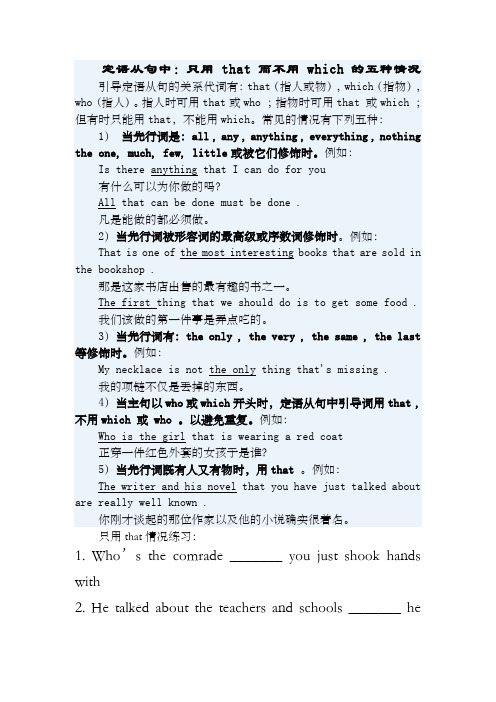
定语从句中:只用that而不用which的五种情况引导定语从句的关系代词有:that(指人或物),which(指物),who (指人)。
指人时可用that或who ;指物时可用that 或which ;但有时只能用that,不能用which。
常见的情况有下列五种:1)当先行词是:all , any , anything , everything , nothing the one, much, few, little或被它们修饰时。
例如:Is there anything that I can do for you有什么可以为你做的吗?All that can be done must be done .凡是能做的都必须做。
2)当先行词被形容词的最高级或序数词修饰时。
例如:That is one of the most interesting books that are sold in the bookshop .那是这家书店出售的最有趣的书之一。
The first thing that we should do is to get some food .我们该做的第一件事是弄点吃的。
3)当先行词有:the only , the very , the same , the last 等修饰时。
例如:My necklace is not the only thing that's missing .我的项链不仅是丢掉的东西。
4)当主句以who或which开头时,定语从句中引导词用that ,不用which 或 who 。
以避免重复。
例如:Who is the girl that is wearing a red coat正穿一件红色外套的女孩子是谁?5)当先行词既有人又有物时,用that 。
例如:The writer and his novel that you have just talked about are really well known .你刚才谈起的那位作家以及他的小说确实很着名。
定语从句只用that情况及其练习。之欧阳术创编

引导定语从句的关系代词有:that(指人或物),which (指物),who (指人)。
指人时可用that或who ;指物时可用that 或which ;但有时只能用that,不能用which。
常见的情况有下列五种:1)当先行词是:all , any , anything , everything , nothing the one, much, few, little或被它们修饰时。
例如:Is there anything that I can do for you ?有什么可以为你做的吗?All that can be done must be done .凡是能做的都必须做。
2)当先行词被形容词的最高级或序数词修饰时。
例如:That is one of the most interesting books that are sold in the bookshop .那是这家书店出售的最有趣的书之一。
The first thing that we should do is to get some food .我们该做的第一件事是弄点吃的。
3)当先行词有:the only , the very , the same , the last 等修饰时。
例如:My necklace is not the only thing that's missing .我的项链不仅是丢掉的东西。
4)当主句以who或which开头时,定语从句中引导词用that ,不用which 或 who 。
以避免重复。
例如:Who is the girl that is wearing a red coat ?正穿一件红色外套的女孩子是谁?5)当先行词既有人又有物时,用that 。
例如:The writer and his novel that you have just talked about are really well known .你刚才谈起的那位作家以及他的小说确实很著名。
定语从句的讲解

定语从句是重要的语法现象,学好定语从句对于更好地理解文章具有相当重要的意义,近年来高考试题多考查引导定语从句的关系代词和关系副词,区别限定性从句和非限定性从句,定语从句和其它从句的不同,关系代词在介词后的使用等。
中学英语学习中定语从句的学习是一个难点,亦是高考中的难点与热点,在高三复习中应着重解决下面几方面的问题。
一、选择关系代词或关系副词的三个步骤及应注意的难点。
第一步:抓住先行词。
看先行词是人还是物,还是一个分句及句子的一部分。
1、人为先行词:考虑用who 、whom 、that 、whose .2、物为先行词:考虑用that 、which 、whose 、where 、why、 when .3、句子或句子一部分为先行词:考虑用as 、which 引导特殊定语从句。
注意:1、副词不能充当先行词,先行词只能为代词或名词。
例如:lt was there where he lived in 1939. (此句不能接受)应改为强调句型: lt was there that he lived in 1939.2、as, which 定语从句先行词有可能是整句话或句子一部分。
例如:His mother didn' t want him to go there , which he did .例如:Bamboo is hollow , which makes it very light .例如:He is an American , as we all known .第一句中先行词为 go there . 第二、三句中分别为整句话。
第二步:把先行词放入定语从句中去,看其在定语从句中作何句子成份。
确定关系代词或关系副词。
例如: The old man went back to the village where he had spent his childhood .(先行词 the village 放入从句中应是he had spend his childhood in the village.由于 in the village 在从句中作地点状语, 故用where) 注意:1、在把先行词放入从句中时,有可能要加入介词才能使句子完整,这时应把加入的介词与先行词一起当作整体,再看这个整体在从句中作何成分来决定用哪个关系词。
(完整版)定语从句-用that而不用which的五种情况
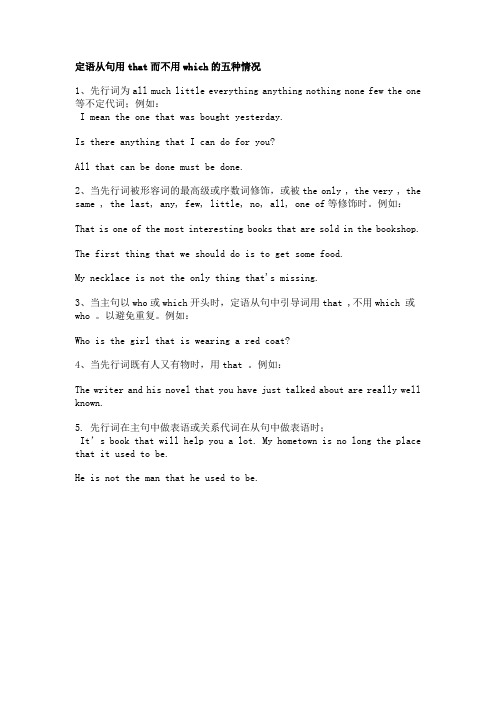
定语从句用that而不用which的五种情况1、先行词为all much little everything anything nothing none few the one 等不定代词;例如:I mean the one that was bought yesterday.Is there anything that I can do for you?All that can be done must be done.2、当先行词被形容词的最高级或序数词修饰,或被the only , the very , the same , the last, any, few, little, no, all, one of等修饰时。
例如:That is one of the most interesting books that are sold in the bookshop.The first thing that we should do is to get some food.My necklace is not the only thing that's missing.3、当主句以who或which开头时,定语从句中引导词用that ,不用which 或who 。
以避免重复。
例如:Who is the girl that is wearing a red coat?4、当先行词既有人又有物时,用that 。
例如:The writer and his novel that you have just talked about are really well known.5. 先行词在主句中做表语或关系代词在从句中做表语时;It’s book that will help you a lot. My hometown is no long the place that it used to be.He is not the man that he used to be.。
只用that不用which的情况口诀
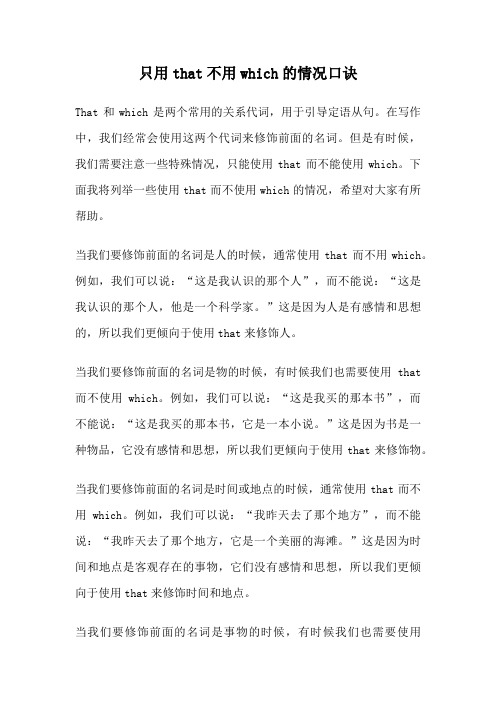
只用that不用which的情况口诀That和which是两个常用的关系代词,用于引导定语从句。
在写作中,我们经常会使用这两个代词来修饰前面的名词。
但是有时候,我们需要注意一些特殊情况,只能使用that而不能使用which。
下面我将列举一些使用that而不使用which的情况,希望对大家有所帮助。
当我们要修饰前面的名词是人的时候,通常使用that而不用which。
例如,我们可以说:“这是我认识的那个人”,而不能说:“这是我认识的那个人,他是一个科学家。
”这是因为人是有感情和思想的,所以我们更倾向于使用that来修饰人。
当我们要修饰前面的名词是物的时候,有时候我们也需要使用that 而不使用which。
例如,我们可以说:“这是我买的那本书”,而不能说:“这是我买的那本书,它是一本小说。
”这是因为书是一种物品,它没有感情和思想,所以我们更倾向于使用that来修饰物。
当我们要修饰前面的名词是时间或地点的时候,通常使用that而不用which。
例如,我们可以说:“我昨天去了那个地方”,而不能说:“我昨天去了那个地方,它是一个美丽的海滩。
”这是因为时间和地点是客观存在的事物,它们没有感情和思想,所以我们更倾向于使用that来修饰时间和地点。
当我们要修饰前面的名词是事物的时候,有时候我们也需要使用that而不使用which。
例如,我们可以说:“这是我最喜欢的那个电影”,而不能说:“这是我最喜欢的那个电影,它是一部经典之作。
”这是因为事物是客观存在的,它们没有感情和思想,所以我们更倾向于使用that来修饰事物。
虽然that和which都是常用的关系代词,但是在某些情况下,我们只能使用that而不能使用which。
这些情况包括修饰人、修饰物、修饰时间和地点以及修饰事物。
在写作中,我们需要根据具体的语境来选择使用合适的关系代词,以使句子更加准确、清晰和流畅。
希望这个口诀能够帮助大家在写作中正确使用that和which。
- 1、下载文档前请自行甄别文档内容的完整性,平台不提供额外的编辑、内容补充、找答案等附加服务。
- 2、"仅部分预览"的文档,不可在线预览部分如存在完整性等问题,可反馈申请退款(可完整预览的文档不适用该条件!)。
- 3、如文档侵犯您的权益,请联系客服反馈,我们会尽快为您处理(人工客服工作时间:9:00-18:30)。
定语从句中:只用that而不用which的五种情况
泰州市苏陈中学朱志荣
引导定语从句的关系代词有:that(指人或物),which(指物),who (指人)。
指人时可用that或who ;指物时可用that 或which ;但有时只能用that,不能用which。
常见的情况有下列五种:
1)当先行词是:all , any , anything , everything , nothing或被它们修饰时。
例如:
Is there anything that I can do for you ?
有什么可以为你做的吗?
All that can be done must be done .
凡是能做的都必须做。
2)当先行词被形容词的最高级或序数词修饰时。
例如:
That is one of the most interesting books that are sold in the bookshop .
那是这家书店出售的最有趣的书之一。
The first thing that we should do is to get some food .
我们该做的第一件事是弄点吃的。
3)当先行词有:the only , the very , the same , the last 等修饰时。
例如:
My necklace is not the only thing that's missing .
我的项链不仅是丢掉的东西。
4)当主句以who或which开头时,定语从句中引导词用that ,不用which 或who 。
以避免重复。
例如:
Who is the girl that is wearing a red coat ?
正穿一件红色外套的女孩子是谁?
5)当先行词既有人又有物时,用that 。
例如:
The writer and his novel that you have just talked about are really well known .
你刚才谈起的那位作家以及他的小说确实很著名。
